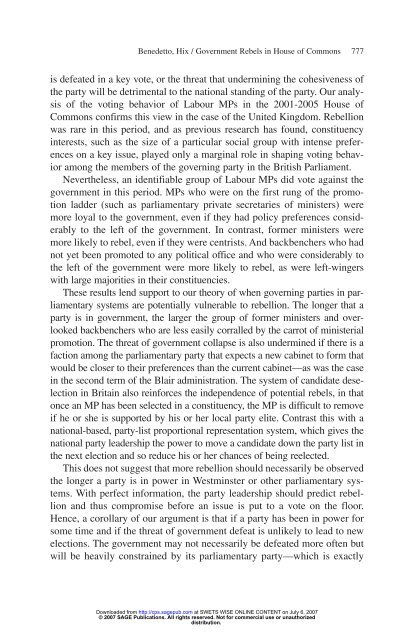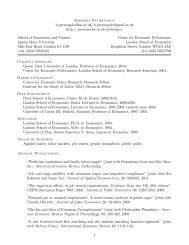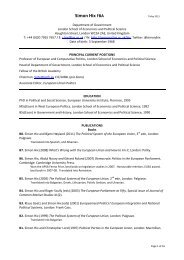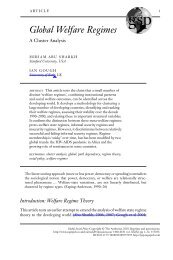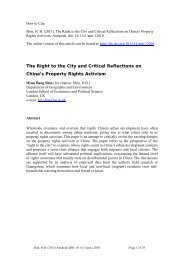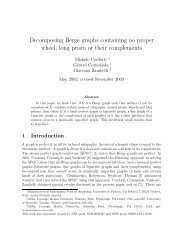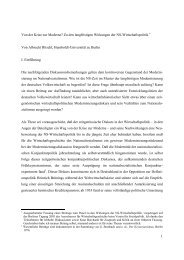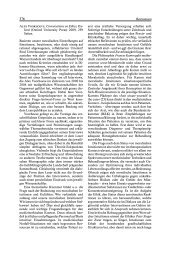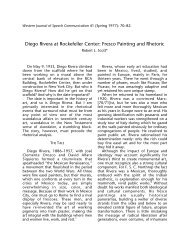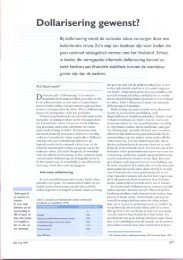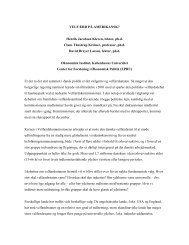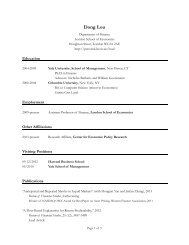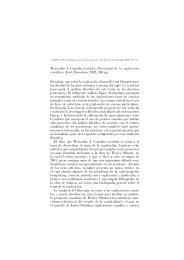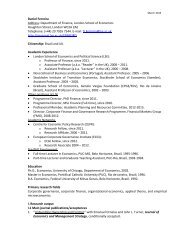The Rejected, the Ejected, and the Dejected: Explaining ...
The Rejected, the Ejected, and the Dejected: Explaining ...
The Rejected, the Ejected, and the Dejected: Explaining ...
Create successful ePaper yourself
Turn your PDF publications into a flip-book with our unique Google optimized e-Paper software.
Benedetto, Hix / Government Rebels in House of Commons 777<br />
is defeated in a key vote, or <strong>the</strong> threat that undermining <strong>the</strong> cohesiveness of<br />
<strong>the</strong> party will be detrimental to <strong>the</strong> national st<strong>and</strong>ing of <strong>the</strong> party. Our analysis<br />
of <strong>the</strong> voting behavior of Labour MPs in <strong>the</strong> 2001-2005 House of<br />
Commons confirms this view in <strong>the</strong> case of <strong>the</strong> United Kingdom. Rebellion<br />
was rare in this period, <strong>and</strong> as previous research has found, constituency<br />
interests, such as <strong>the</strong> size of a particular social group with intense preferences<br />
on a key issue, played only a marginal role in shaping voting behavior<br />
among <strong>the</strong> members of <strong>the</strong> governing party in <strong>the</strong> British Parliament.<br />
Never<strong>the</strong>less, an identifiable group of Labour MPs did vote against <strong>the</strong><br />
government in this period. MPs who were on <strong>the</strong> first rung of <strong>the</strong> promotion<br />
ladder (such as parliamentary private secretaries of ministers) were<br />
more loyal to <strong>the</strong> government, even if <strong>the</strong>y had policy preferences considerably<br />
to <strong>the</strong> left of <strong>the</strong> government. In contrast, former ministers were<br />
more likely to rebel, even if <strong>the</strong>y were centrists. And backbenchers who had<br />
not yet been promoted to any political office <strong>and</strong> who were considerably to<br />
<strong>the</strong> left of <strong>the</strong> government were more likely to rebel, as were left-wingers<br />
with large majorities in <strong>the</strong>ir constituencies.<br />
<strong>The</strong>se results lend support to our <strong>the</strong>ory of when governing parties in parliamentary<br />
systems are potentially vulnerable to rebellion. <strong>The</strong> longer that a<br />
party is in government, <strong>the</strong> larger <strong>the</strong> group of former ministers <strong>and</strong> overlooked<br />
backbenchers who are less easily corralled by <strong>the</strong> carrot of ministerial<br />
promotion. <strong>The</strong> threat of government collapse is also undermined if <strong>the</strong>re is a<br />
faction among <strong>the</strong> parliamentary party that expects a new cabinet to form that<br />
would be closer to <strong>the</strong>ir preferences than <strong>the</strong> current cabinet—as was <strong>the</strong> case<br />
in <strong>the</strong> second term of <strong>the</strong> Blair administration. <strong>The</strong> system of c<strong>and</strong>idate deselection<br />
in Britain also reinforces <strong>the</strong> independence of potential rebels, in that<br />
once an MP has been selected in a constituency, <strong>the</strong> MP is difficult to remove<br />
if he or she is supported by his or her local party elite. Contrast this with a<br />
national-based, party-list proportional representation system, which gives <strong>the</strong><br />
national party leadership <strong>the</strong> power to move a c<strong>and</strong>idate down <strong>the</strong> party list in<br />
<strong>the</strong> next election <strong>and</strong> so reduce his or her chances of being reelected.<br />
This does not suggest that more rebellion should necessarily be observed<br />
<strong>the</strong> longer a party is in power in Westminster or o<strong>the</strong>r parliamentary systems.<br />
With perfect information, <strong>the</strong> party leadership should predict rebellion<br />
<strong>and</strong> thus compromise before an issue is put to a vote on <strong>the</strong> floor.<br />
Hence, a corollary of our argument is that if a party has been in power for<br />
some time <strong>and</strong> if <strong>the</strong> threat of government defeat is unlikely to lead to new<br />
elections. <strong>The</strong> government may not necessarily be defeated more often but<br />
will be heavily constrained by its parliamentary party—which is exactly<br />
Downloaded from<br />
http://cps.sagepub.com at SWETS WISE ONLINE CONTENT on July 6, 2007<br />
© 2007 SAGE Publications. All rights reserved. Not for commercial use or unauthorized<br />
distribution.


